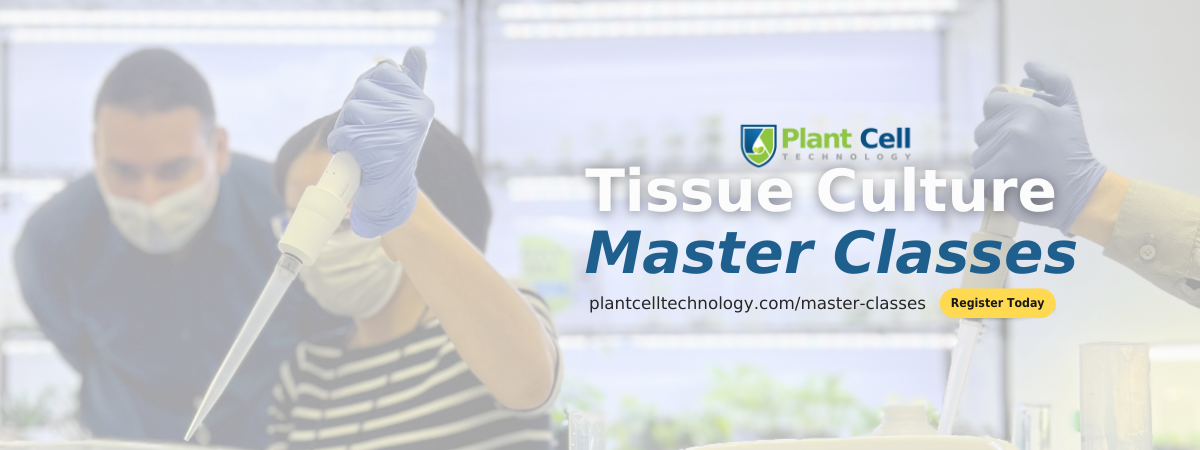
For Beginners: Why You Should Take a Tissue Culture Course?
As a content and community manager, I leverage my expertise in plant biotechnology, passion for tissue culture, and writing skills to create compelling articles, simplifying intricate scientific concepts, and address your inquiries. As a dedicated science communicator, I strive to spark curiosity and foster a love for science in my audience.


Introduction
Tissue culture is now a popular technology in the agriculture and horticulture sector. It’s mainly because of the numerous benefits of the techniques over traditional ones, such as:
- Production of disease-free plants
- Production of haploid and hybrid plants
- Production of plants at a large scale for industrial or commercial purposes, irrespective of their seasons
- Conservation of elite varieties of plants and genetics
- Production of plants that are difficult to propagate using traditional approaches
The technique has driven the attention of many other growers, culturists, and plant enthusiasts for producing plants with desired traits and characteristics.

However, being alien to the technology makes it difficult for the growers to get started in it. If you’re reading this blog, you might also be one among them. And, that’s why you need to attend tissue culture courses that help you to introduce the technology and get started with it.
This blog presents an overview of the challenges faced by tissue culture beginners at the start and how a suitable course providing hands-on experience can help you out to be an expert in exploiting the technology for use.
Challenges Beginners Face While starting Into Tissue Culture

While tissue culture seems easy and interesting, it does require fundamental knowledge to get started in it. You should have basic theoretical knowledge of the technique, should be aware of the terminologies used in the subject (it helps you to understand the procedure), and should have hands-on experience with the technique.
Here’re some challenges that you might face while getting started in tissue culture. The answer to all these barriers is given at the end of this article.
Understanding the Requirements of Tissue Culture and Establishing a Laboratory
When you are new to tissue culture, the major issue is understanding what you need to introduce your plants in tissue culture. How can you grow your plant in tissue culture? How to create suitable physiological conditions for your plant to grow and develop properly? How can you establish a tissue culture lab for yourself? Do you need a home-based lab or a commercial-sized lab for your goal? How can you create a home-based lab? What budget do I need to create a lab for myself? And, so many questions!
And it’s difficult to find the answers to these basic questions.
Though the tissue culture technique has been around for a long time, it was only limited to researchers or commercial setups. That’s why you won’t find many people around you, like farmers or plant growers, who can help you with it. You need to talk to an expert or use all the available info you have on the internet for your use. But, where can you find it?
Understanding How Tissue Culture Works
While starting out, you might not know how to best utilize the technique for your use. How you can produce plants on a commercial scale? How can you produce disease-free plants? How can you introduce your plant in tissue culture to grow and develop?
Many questions to wonder about!
Tissue culture is an advanced technology, and if you don’t know how to prepare media, how to obtain explants, how to culture your plant, and how to maintain sterile conditions, you will end up losing all the effort and cost put into the process.
Though, tissue culture is a technique with many advantages, the major limitation of the process is the “cost” associated with the process. Thus, it’s essential to understand how you can exploit the technique to achieve your goal.
Confusion on the Stages of Tissue Culture
Many beginners confuse that tissue culture only has one stage and they need only one kind of tissue culture media to grow plants. This is wrong!
Tissue culture consists of four stages:
- Establishment stage: Explant (starting plant tissue) is taken from the mother plant, surface sterilized, and introduced in the tissue culture media.
- Multiplication stage: The established plants are transferred to a new media containing shooting hormone for the shoot regeneration of the plant.
- Rooting stage: The plants with 2-3 cm shoots are transferred to a new media supplemented with root hormones for regeneration.
- Acclimation stage: The platelets with roots and shoots are transferred to a peat-perlite mixture in a greenhouse to prepare them for the natural environment.
All these stages require different media formulations for their development. But how to decide what components you need to mix for each stage?
Creating a Protocol
What is a protocol?
A protocol is a working procedure or step-by-step process to introduce a plant into tissue culture. It contains all the details of growing a plant in a lab environment, such as the chemicals you need to prepare tissue culture media for each stage, how to sterilize the explant, what plant hormones, and in what concentration you need for the organ's development of your plants, and what physiological environment will be suitable for a particular plant.
Each plant species (and often varieties) prefer different procedure to grow in a lab environment.
Media Preparation and Plant Hormones Solution Preparation
Media preparation is one of the most essential parts of tissue culture. Perfect media can help your plant grow and develop, however, a non-suitable one might kill all your plants. Thus, you need to be mindful of what your plants need and what you should add to prepare media for them.
While media preparation, you might tackle questions like:
- In what order should I add each component to prepare the media
- When should I adjust the pH of the media
- What components can I autoclave with media and what not?
- If using the plant preservative mixture (PPM) to prevent contamination, you might need to know how to add it, when to add it, and if you can sterilize it or not.
- How can you prepare plant hormone solutions and if they can be autoclaved with media?

How Tissue Culture Master Class Can Help?
Taking a tissue culture class can help you to a lot extent. Not only in understanding the terminologies associated with the process, but it can also help you the benefits and application of the technique.
However, the benefits of attending class or taking a course are increased to 4X when you get to take a class that combines both, theoretical knowledge and practical experiments.

Where can you find such a class?
Plant Cell Technology has it!
We’re offering tissue culturists, growers, and plant enthusiasts a comprehensive tissue culture master class that give them proper training to start into tissue culture.
Here’re the benefits that you might enjoy after taking this class:
- Learning about the basics of tissue culture and understanding all terminologies in a practical way so you remember them all.
- Introduction to all equipment used in tissue culture, how they work, and how you can use them.
- Learning about building a home-based or commercial-scale tissue culture lab on a low to high budget.
- Creating a protocol or resources to search for them.
- Media preparation includes the order of adding individual components, adjusting pH, and autoclaving.
- Learning about the technique of obtaining explants from the mother source and surface sterilizing of explants.
- General practices to follow to provide complete aseptic conditions for protecting your plants against all kinds of contamination.
- Get a working protocol for the plant you attend the master class.
- Get all your tissue culture questions from an expert.
- How to regenerate healthy shoots and roots of your plants.
- Tips and process of best acclimating a plant.
- Network with like-minded tissue culturists.
And, there’s much more!!
Our master classes are basically a package to prepare and train you to instantly get started in the process by delivering you exactly what you need.
So, level up your tissue culture game by signing up for the masterclass TODAY!
P.S. At the same link you’ll also find the details of our upcoming master classes.
Blog Categories
View by Level
Popular Blogs

How MSAP Tracks the "Invisible Stress" of Plant Tissue Culture
In plant tissue culture, researchers often encounter a phenomenon where regenerated plants do not resemble the donor plant, despite being genetic...
Read More
Why Labor is Modern Tissue Culture’s Greatest Challenge
Introduction If you look at the numbers, the plant tissue culture industry is on a meteoric rise. We are looking...
Read MoreSubscribe to Our Newsletter








Join the conversation
Your email address will not be published. Required fields are marked